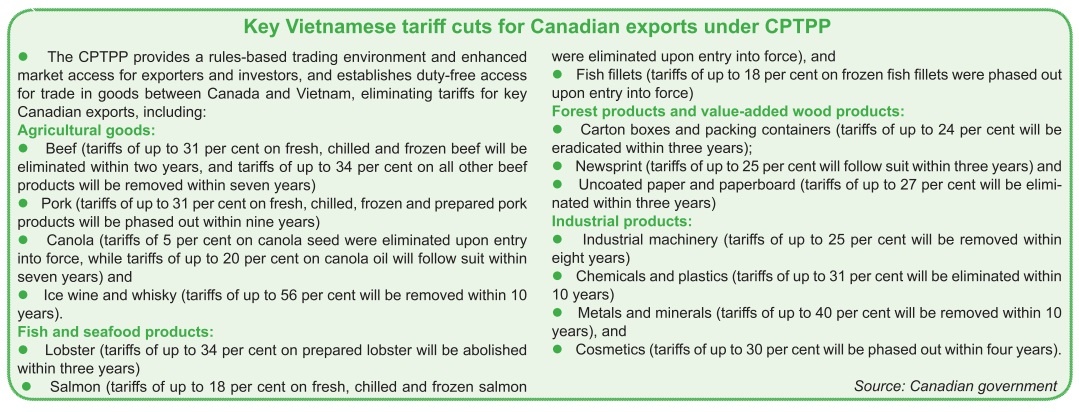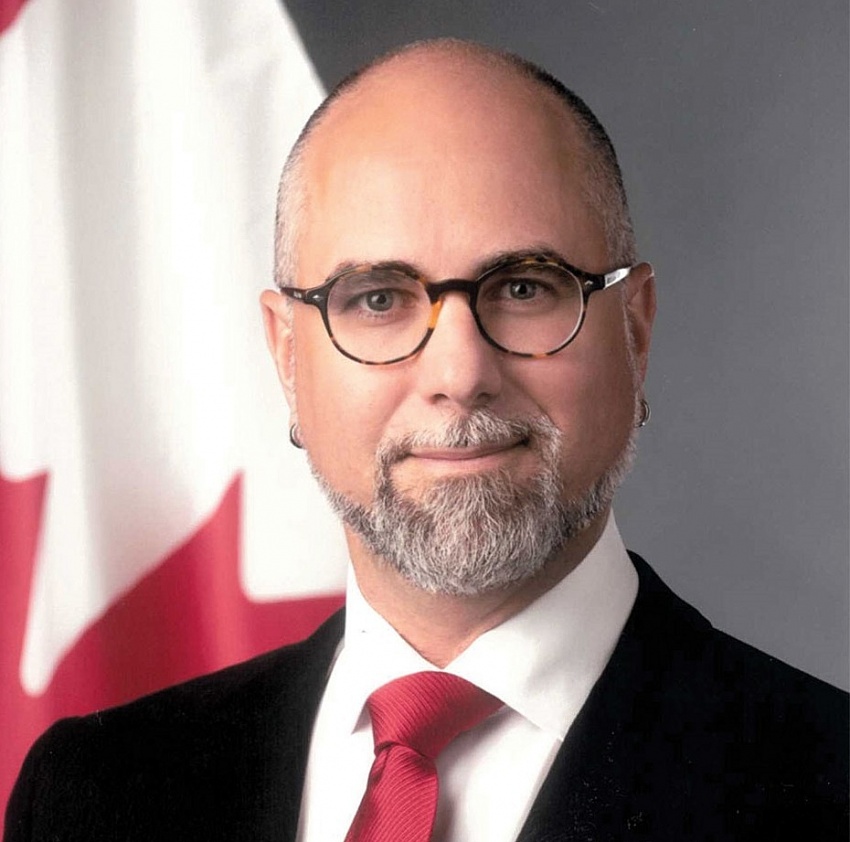Canada eager to hike interest across Vietnam
 |
| The CPTPP is a key drivers of economic, trade, and investment ties between Canada and Vietnam, photo Le Toan |
The Vietnamese Trade Office in Canada over a week ago reported that the Canadian government will send the largest-ever business delegation to Vietnam in search of trade and investment bonanzas.
Led by Canadian Minister of Small Business, Export Promotion and International Trade Mary Ng, the delegation will come to Vietnam at the end of March next year and work with Vietnamese partners about cooperation opportunities in the sectors of processed foodstuffs, biomedicine, clean energy, new technology, IT, innovation, and aviation tech.
At present, the Canadian side is working with Vietnam’s related ministries, sectors, and localities about preparations for the Canada-Vietnam trade and investment events in Vietnam. It is expected that many Vietnamese companies will meet with Canadian partners.
“In fact, many Canadian businesses previously never thought about doing business outside the North America region. But now they have changed their mindset, seeing that Vietnam is a good gate for them to enter the Southeast Asian market,” the Vietnam Trade Office said.
“Meanwhile, with their big advantages in technology, finance, sale networks, and logistics in America, Canada can also act as a good gate for Vietnamese companies to expand their performance. Both sides’ businesses will be reliable partners to diversify supply chains, boost green transition and innovative connectivity between the two economies.”
The sending of this business delegation to Vietnam will be the second to be organised by the Canadian government, after the first with 160 companies in November to Japan. It is part of Canada’s Indo-Pacific Strategy, which considers ASEAN as one of the prime partners in the globe which it is pursuing to sign a free trade agreement with at the end of 2024.
According to the Vietnamese Ministry of Industry and Trade, the Canada-Vietnam trade turnover hit more than $10 billion last year – doubling the figure before 2018 when the Comprehensive and Progressive Agreement for Trans-Pacific Partnership (CPTPP) had yet to take effect. In the first 11 months of 2023, the figure reached $5.17 billion, with Vietnam’s exports of $4.67 billion and imports of $505 million.
Minister Mary Ng said that Vietnam is an attractive market for Canada. During their stay in Vietnam, leaders of Canadian companies will meet with leaders of the Vietnamese government, business associations, and companies to study problems about policies and opportunities in taking advantage of free trade deals and existing mechanisms between the two economies, as well as opportunities for investment and goods sales, and expansion of supply chains into Vietnam.
At a meeting in September in Indonesia, Vietnamese Prime Minister Pham Minh Chinh met with Canadian counterpart Justin Trudeau, proposing that Canada further facilitate Vietnamese goods into the Canadian market, and both nations need to boost bilateral ties in the new sectors of digital transformation, green growth, response to climate change, tourism, and science and technology.
In addition, Vietnam is expecting more investments from Canada and expanding trade ties with this nation, with the CPTPP considered one of the key drivers of both economies’ economic, trade, and investment ties.
The 10-member CPTPP took effect for Canada in 2018 and for Vietnam in 2019. To raise such ties and take advantage of the CPTPP, earlier last year, Canada and Vietnam established a joint economic committee, whose second meeting will be organised in March 2024, and which will provide an opportunity to discuss emerging trade and investment issues.
“The CPTPP allows Canadian companies to invest with greater confidence in Vietnam, offering them protections from unfair and discriminatory treatment, as well as greater predictability and transparency,” said a Canadian government document on the issue.
“Vietnam’s commitments on financial services go beyond what it has offered in previous free trade agreements, creating new opportunities for Canadian financial services providers.”
Cumulatively as of November 20, Canada had 258 valid projects in Vietnam registered at $4.81 billion, according to Vietnam’s Ministry of Planning and Investment.
Some major Canadian projects are underway successfully in Vietnam, including the $4.3 billion Ho Tram project licensed in 2008, focusing on resorts, hotels, entertainment, and a casino in the southern province of Ba Ria-Vung Tau.
In another case, Canada’s Triple Eye Infrastructure Corp in 2014 was licensed to set up a joint venture with Vietnam’s Dai An JSC Co., to invest $260 million into building Dai An Vietnam-Canada International Hospital in the northern province of Hai Duong.
According to the Canadian government, Vietnam is Canada’s largest trading partner in the ASEAN region. The priority sectors in Vietnam for Canadian commercial interests are agriculture and agri-food, education, ICT, clean technology, infrastructure, aerospace, and also life sciences.
| Shawn Perry Steil - Canadian ambassador to Vietnam
We see Vietnam having great potential for Canadian investors and expect they will continue to place more money in the country. Many Canadian investors are exploring opportunities in a wide range of sectors, such as infrastructure, resorts, and insurance. Further proof of Canadian funding in Vietnam is in the insurance industry. Canadian insurance companies such as Manulife and Sun Life are leading investors and service providers in the industry here. We have a small basis of investment here in Vietnam, and we’re at the bottom of the curve where we should see a rebound in the years to come, as long as the business environment is stable, consistent and transparent. I believe that the Canadian investment landscape in Vietnam will be improved. We have seen improvements since 2019, and Vietnam’s accession to the CPTPP. But when Vietnam acceded to the agreement, it was on the understanding that it would take time for Vietnam to meet some provisions and standards. Canada is actually looking at ways that we can further support Vietnam to meet those standards. European and North American markets and investors are increasingly looking to environmental sustainability and labour standards. Part of the CPTPP is standards on environment and labour, and Vietnam is still working towards meeting them. But that’s an enormous opportunity for Vietnam. In an era where supply chains are becoming fragile and unreliable, Vietnam can become a reliable partner to ensure that critical supply chains are maintained. Many Canadian companies are planning to come to Vietnam. I believe the country will continue doing a good job in removing obstructions in favour of enterprises and investors, in order to attract more foreign funding. |
 |
What the stars mean:
★ Poor ★ ★ Promising ★★★ Good ★★★★ Very good ★★★★★ Exceptional
 Tag:
Tag:
Related Contents
Latest News
More News
- SK Innovation-led consortium wins $2.3 billion LNG project in Nghe An (February 25, 2026 | 07:56)
- THACO opens $70 million manufacturing complex in Danang (February 25, 2026 | 07:54)
- Phu Quoc International Airport expansion approved to meet rising demand (February 24, 2026 | 10:00)
- Bac Giang International Logistics Centre faces land clearance barrier (February 24, 2026 | 08:00)
- Bright prospects abound in European investment (February 19, 2026 | 20:27)
- Internal strengths attest to commitment to progress (February 19, 2026 | 20:13)
- Vietnam, New Zealand seek level-up in ties (February 19, 2026 | 18:06)
- Untapped potential in relations with Indonesia (February 19, 2026 | 17:56)
- German strengths match Vietnamese aspirations (February 19, 2026 | 17:40)
- Kim Long Motor and AOJ Suzhou enter strategic partnership (February 16, 2026 | 13:27)























 Mobile Version
Mobile Version